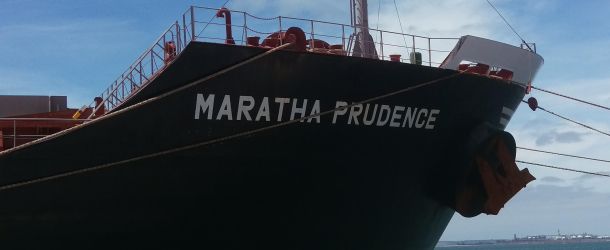
A New Year's gift of an estimated US $3,7 million. That's what Australia's Incitec Pivot paid the Moroccan government for its first 2016 shipment of phosphate rock sourced in occupied Western Sahara.
On 5 and 7 January, the bulk carrier Maratha Prudence discharged 8,000 tonnes in Portland and another 22,000 tonnes in Geelong - the two ports were Ozzie fertilizer producer Incitec Pivot Limited (IPL) takes in its cargoes of raw material. The discharge operation is said to have ended last Sunday, 10 January.
WSRW's Australian Member Organisation, AWSA, had protested the shipment in December, while the vessel was still on course for Australia. "As we have pointed out to you many times in the past, the material is being sold to IPL, not by its rightful owners the Saharawi people, nor with their consent, but by the occupying power in their country, Morocco. As we continue to remind you, every transaction with Morocco involving goods from Western Sahara, strengthens Morocco’s resolve to resist a fair resolution of this decades long occupation", AWSA president Lyn Allison wrote to the Chairman of the IPL Board, Mr Paul Brasher.
AWSA also took the floor at Incitec's AGM in Melbourne on 17 December, questioning the legality and ethics of IPL's continued imports from Africa's last colony. Their intervention was covered in a piece from The Weekly Times on the need for scrutiny at corporate annual meetings.
Incitec Pivot has been subject to blacklisting by investors over the past few years, precisely due to its imports from occupied Western Sahara and related human rights concerns.
The company maintains that its shipments are perfectly lawful.
On 10 December 2015, the Court of Justice of the European Union annulled the EU-Morocco Free Trade Agreement as it was applied in Western Sahara. In its verdict, the Court stated in very clear terms that Morocco does not possess any mandate by the United Nations or by any other international institution for the administration of the territory.
US eyes minerals in occupied Western Sahara
Seeking to position itself as a key supplier of strategic minerals for Western powers, Morocco has signed a new agreement with the United States that covers Western Sahara’s waters and the critical minerals harboured there.
TAQA-Moeve obtains land in occupied Western Sahara
Morocco’s push for green hydrogen has taken a decisive step forward - on territory it does not legally own.
EU-Morocco Statement: autonomy without self-determination, law without lawfulness
A joint statement that came out of last week’s EU-Morocco Association Council asks readers to believe in a fiction: that an undefined autonomy plan imposed by an occupying power can satisfy the right to self-determination, and that respect for international law can coexist with the systematic ignoring of the EU’s own highest court.
Greenland Yes, Western Sahara No? The EU’s self-determination test
As the European Union rightly rallies behind Greenlanders’ right to decide their own future in the face of external pressure, a test of the EU’s real commitment to self-determination is quietly unfolding in Brussels.



